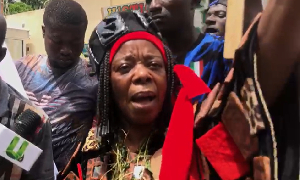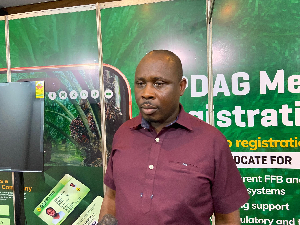I write in response to the above publication on Wednesday 20th of December 2006 in Mr. Kwasi Pratt’s paper The Insight, page 3, under the column “To the Point with Ebow Duncan, trying to set the records straight”. The writer was giving us a historical account as to who started violence in Ghanaian Politics. The new Ghanaian (age 18-39) is not interested in this kind of history lesson; the question is who really cares?
As much as we know the adage that it is good to know your history so you will know where you are coming from to decide the way forward, this new generation believes that the way forward is to see our elders preach reconciliation, peace and accounts of progress from that era, instead of outlining who was more violent and who started what. The fact is most of us, the youth, the future leaders of Ghana , were not born before 1966 and the happenings of that era as important as it was, will not make a dent in my future.
There are sections of the public and some senior journalists who have made it their resolution to continuously and consistently link the U.P. tradition and for that matter NPP to the 1966 coup d’etat, tagging it as the most violent tradition and this style of reportage is not helping us the youth.
Anytime Ghana’s independence is mentioned, the next thing that comes to mind is the name Osagyefo Dr. Kwame Nkrumah of blessed memory. He is by far the most celebrated personality in our political history and one of the celebrated heroes in the world. But it must also be noted that the struggle for independence started long before Nkrumah came to the scene, the gallant personalities who started the struggle are the same people who brought Nkrumah from UK to join the UGCC. At least, that is the kind of history I have read. Is posterity going to forgive us when we attempt to showcase our history in a divisive manner? I can say that all Ghanaians did fight for the end of colonialism in one form or the other, it was not a one man show, that is the spirit I was expecting in this historical lesson, Nkrumah himself, according to history, wanted a united independent Africa that is the kind of history, my generation cherish.
Fellow Ghanaians, somebody can also say that all was not well during Nkrumah’s regime. Under Nkrumah, we had Preventive Detection Act (PDA) and One Party State which depicted dislike for multi-party democracy and its tenets. Obetsebi Lamptey, one of the leaders who together with Nkrumah and the others fought for independence was detained in Nsawam Condemned Block on October 5 1962 and died on his sick bed in Nsawam Prison on January 29 1963. Dr. J.B. Danquah, the leader of the United Gold Coast Convention (UGCC) who invited Nkrumah to the struggle for independence was also arrested and detained twice. He also died in the Condemned Block of Nsawam Prison on February 5 1965. Is this what we want to talk about? Are they going to put food on the table? Are they going to put money in our pockets? Of course not!
To me the achievements of Dr. Kwame Nkrumah are marvelous and up till now no political leader in our history can march up to him. Nevertheless, with consistency, commitment to the current economic growth and good governance, His Excellency President John Agyekum Kufuor I believe is on the path of leaving a great legacy. We should celebrate the success of our past heroes, but we should not make the mistake of rewriting history to make saints out of mortals.
What the new Ghanaian and the current generation is looking for are the building of bridges of progress, free schooling, free bus ride for school children and the aged, free school feeding for pupils, national youth employment for the youth, health insurance, road construction, low interest rate, downwards inflation, GDP Growth, stable micro and macro economy, stable currency, affordable housing, appreciable minimum wage, press freedom, good governance, and the unbridled quest for democracy, rule of law etc. These are the types of historical data we would appreciate.
If we want to talk about violence and the most violent tradition or political party in our history, you will all agree with me except the sycophants that, it is not the U.P (NPP) tradition. We know of a political party whose founder is touring the world demonstrating he believes in military regime as opposed to democratic regime. I know of a woman living in Bantama, a suburb of Kumasi in the Ashanti Region who is suffering from permanent disability due to the atrocities of the PNDC/AFRC era. Children my age lost their parents for no just course, former heads of states, judges and some personalities were shot in cold blood. Others were imprisoned for possessing 50 CEDIS, properties were confiscated, companies were closed down, buildings were pulled down and many more. The whole country endured curfew, people were forced to sleep from six to six for more than two (2) solid years. Do you want the youth to worry our heads over all these negative historical accounts as against progressive thinking?
What we should do is to stand on the shoulders of all past sons and daughters of Ghana (both heroes and villains) who shed their blood to give us this beautiful nation. When our history is asked, we intend to tell the heroic stories, how independence was won for us and where we have been able to reach since then. We do not intend to relive the vengeful tales and finger pointing; this is the view of the new Ghanaian.
Ghana has suffered a lot of downward progress all because of violence and consistent military interventions in the past. AFRC and PNDC took almost half of the years of our political history since independence. Having said that, our generation is more attuned with the information age and would love to see our elders harness our creativity, connect with us to share our enthusiasm for globalization, global citizenship and international brotherliness, our generation as much as we appreciate history is burnt on building future alliances to survive.
The important thing is that after the last military intervention, governments and especially the NPP government has demonstrated serious commitment to put all this behind us to move the nation forward in one fold. We should therefore abhor and stand against the so called senior journalists in sheep clothing preaching division, ethnicity, tribalism and some unnecessary history that will not put food on the table nor contribute to our national growth and most especially my future as a youth.















